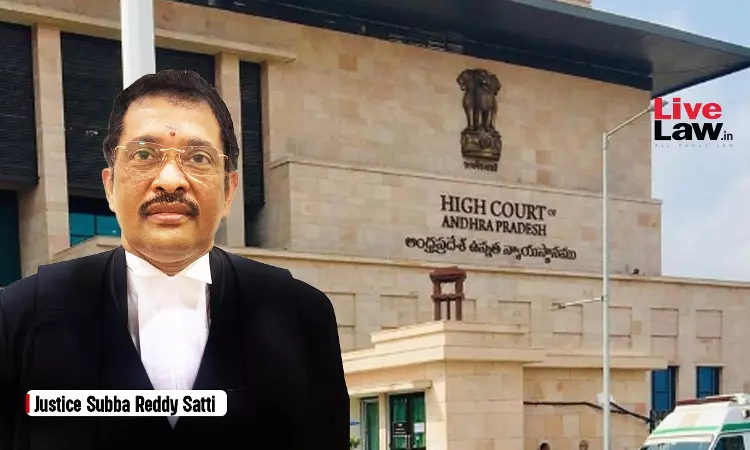- Home
- /
- High Courts
- /
- Andhra Pradesh High Court
- /
- Andhra Pradesh High Court Dismisses...
Andhra Pradesh High Court Dismisses Plea Challenging Tie-Breaker Lottery Clause In Tender Document
Saahas Arora
25 April 2025 12:15 PM IST
The Andhra Pradesh High Court has dismissed a plea seeking to declare a lottery clause in a tender document, which envisaged that in case two bidders quote lowest commission, the tie will be broken based on draw of lottery— as arbitrary and violative of the principles of natural justice.A Single Judge Bench of Justice Subba Reddy Satti held,“…the said clause, impugned in the writ...
The Andhra Pradesh High Court has dismissed a plea seeking to declare a lottery clause in a tender document, which envisaged that in case two bidders quote lowest commission, the tie will be broken based on draw of lottery— as arbitrary and violative of the principles of natural justice.
A Single Judge Bench of Justice Subba Reddy Satti held,
“…the said clause, impugned in the writ petition, by no stretch of imagination can be termed as arbitrary. In fact, the said clause was incorporated as part of fairness in the selection process. It is pertinent to mention here that the petitioner, even without participating in the tender process, approached this Court.”
Facts:
The Andhra Pradesh Transmission Corporation Limited (Respondent 2) had called for tenders for carrying out operation and maintenance work, including watch and ward, house-keeping and gardening, MRT Assistance and assistance for Telecom of E.H.T sub-stations and lines, and CBD and SM Gangs for lines and sub-stations, on contractual basis. Clause 5(iii) of the bid document, which formed the core of the petition, stipulated that in case one bidder is qualified as L1 for more than two works, award of two works will be on the basis of on lowest tender quoted percentage and in case of same percentage, it shall based on lottery.
Challenging this clause, the petitioners, who claimed to possess A Grade license and were authorised to carry out electrical installations, argued that the same does not consider the financial viability and turnover of the contractor and imposing the lottery system in the tender notification amounted to arbitrary action and violated principles of equality, fairness and arbitrariness.
The Respondents countered by submitting that neither any legal rights nor fundamental rights of the petitioners were infringed, and under the tender conditions, the estimated contract value, which covers salaries of staff under contract, is fixed, and the bidder has to quote bid only towards percentage of commission on Estimated Contract Value (ECV) for the purpose of administrative/supervision charges. It was alleged that the work did not involve much complexity and the condition that if more than one bidder quotes the same percentage and they are found to be the lowest tender, the bidder would be selected based on lottery, was added to save the selection process of bidder from any allegation of favouritism.
Findings:
At the outset, the Court noted that to declare any Rule or clause as ultra vires, specific pleading to challenge the same and asking for such relief should be made and if such relief not found on the pleadings, it should not be granted. “The decision in the case should not be based on grounds outside the pleadings of the parties. In the absence of pleadings, evidence, if any, produced by the parties, it may not be considered. No party should be permitted to travel beyond its pleadings, and the parties are bound by the necessary material facts regarding the case set up by them. A pleading ensures that both sides are fully aligned and aware of the questions that are likely to arise and the opportunity of placing relevant evidence before the Court for its consideration.”
Highlighting the absence of specific pleadings, Court held,
“Except for stating that said clause is arbitrary, nothing was pleaded as to how said clause is arbitrary and how it violates the principles of Natural Justice. No pleading is averred in the affidavit in this regard. In the absence of pleading, the contention of the learned counsel for the petitioner vis-à-vis the alleged arbitrariness of the other clauses in the tender document, in the considered opinion of this court, cannot be adjudicated.”
Additionally, it was held that the clause was added for infusing the selection process with fairness and the petitioner, without even participating in the tender process, approached the High Court and demanded the invocation of its extraordinary jurisdiction.
Holding that the said clause was not arbitrary and did not defeat the principles of natural justice, the Court found no merit in the petition and accordingly dismissed it.
Case Details:
Case Number: WRIT PETITION NO: 331/2025
Case Title: G Venkata Ramana v. The State Of Ap and Others
Date: 22.04.2025



